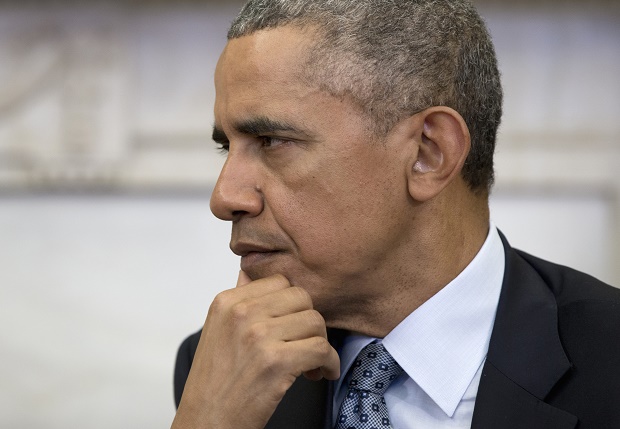Obama looks to take fight vs ISIS in Libya

President Barack Obama listens as Australian Prime Minister Malcolm Turnbull speaks in the Oval Office of the White House in Washington, Tuesday, Jan. 19, 2016. Obama welcomes Turnbull, his first foreign leader of the new year, for talks that will cover the ISIS militant group and a 12-nation Pacific Rim trade agreement. AP Photo
WASHINGTON, United States—President Barack Obama has asked key advisors to draw up options for ratcheting up the fight against the Islamic State of Iraq and Syria (ISIS) group, including opening a new front in Libya.
Eighteen months after a US-led coalition began airstrikes against ISIS in Iraq and Syria, multiple administration sources said Friday that the White House wants to speed up and broaden the effort.
READ: Obama: US ‘will not relent’ in Islamic State campaign
Efforts will deepen to retake Raqa in Syria, Mosul in Iraq and to check the jihadists’ growth in Afghanistan, but there is an increasing focus on Libya.
Potential options are said to range from intensified air strikes to participation in a UN-backed ground force that would help take Libya’s estimated 3,000 ISIS fighters.
Officials caution that Obama has not yet been presented with concrete military plans, though the security situation is acute.
READ: Obama warns ISIS leaders: ‘You are next’ in kill list
“Action in Libya is needed before Libya becomes a sanctuary for ISIL (or ISIS), before they become extremely hard to dislodge,” said one US defense official.
“We don’t want a situation like in Iraq or Syria.”
Since rebels and Western airpower toppled Moamer Kadhafi’s regime in 2011, the country has effectively lacked a government.
In the chaos a disparate group of foreign fighters, homegrown militiamen, tribes and remnants of the Libyan Islamic Fighting Group have coalesced around the ISIS banner and gained a foothold.
Jihadists have recently taken control of Kadhafi’s home town of Sirte, a strategic port near oilfields that could provide a lucrative source of income.
Next steps
Until now, US involvement in Libya has been limited to isolated airstrikes and the deployment of US special forces, who are building ties with local armed groups and providing intelligence.
In November, an American F-16 fighter jet struck the eastern town of Derna, killing Abu Nabil—also known as Wissam Najm Abd Zayd al-Zubaydi—the local ISIS leader.
On Thursday, Obama convened his National Security Council to discuss current operations and the next steps.
“The president directed his national security team to continue efforts to strengthen governance and support ongoing counterterrorism efforts in Libya and other countries where ISIL has sought to establish a presence,” according to a White House account of the meeting.
Republicans, with one eye on November’s US presidential election, have pilloried Obama and one-time secretary of state Hillary Clinton for not doing more to prevent ISIS’s rise.
“Congress has been calling for a real strategy from the president to defeat ISIS,” said a spokesman for House Speaker Paul Ryan.
“We’ll see whether this is just more talk or if it will be backed up with the will and the resources necessary for victory.”
Further steps—including ground operations—are likely to depend on Libyans’ ability to form a Government of National Accord, which the UN is still trying to bring together.
“There needs to be a political solution to get a military solution,” said another defense official, echoing comments from diplomats.
“We hope that there is the beginning of a political solution so that there is a legitimate government that can invite us to go after ISIL.”
Washington is also looking to European nations—facing a more acute threat from the collapse of a country a short distance across the Mediterranean—to play a leading role, including former Libyan colonial power Italy.
Obama will host the Italian head of state, President Sergio Mattarella, at the White House on February 8.
France and Britain are also slated as possible contributors.
Secretary of State John Kerry is expected to meet his European counterparts in Rome on February 2.
“The idea is to have a coalition of nations,” a defense official said.
Some security experts say the deteriorating situation on the ground may leave the administration few options but to launch a ground campaign, even if the long-term path is unclear.
“The unfortunate reality is that this is a bad option, but it’s the only one,” said Patrick Skinner, a former CIA case officer now with The Soufan Group, a consultancy.
IS-linked terror attacks from Turkey to Indonesia have sharpened concerns about the group’s reach and potency, even as it suffers losses in Mesopotamia.
“They cannot let the Islamic State run Libya, they just can’t.”
“They are holding really key spots. You can’t let the Islamic State have a port, that’s insane.”
According to Karim Mezran, a Libya expert at the Atlantic Council, any government in Libya is unlikely to survive without foreign support and would have to invite in foreign troops in.
“Without an international force of support there is no way the new government can ever get into Tripoli,” he said.














